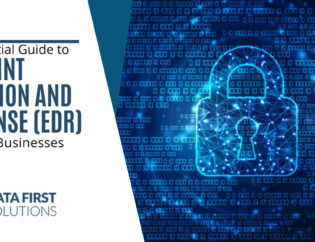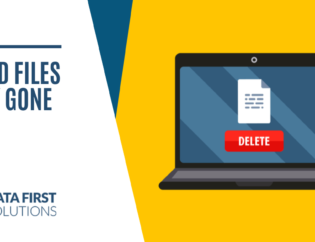
What is a backup?
A backup is essentially a copy of your data, used to protect against system failures, attacks and other disruptions such as floods, storms of fire. Backups also help to prevent data corruption that occurs when copying, sending and editing files between multiple users.
Backups are also super important in the defense against ransomware. Should an attacker lock your sensitive files, a recent backup could be the difference between whether you choose to pay a ransom demand or not.
To Test Or Not To Test Your BackUps?
Backups, for numerous reasons, are undoubtedly a great tool for businesses. But they’re not fool-proof. 75% of IT managers who had a backup system in place couldn’t restore all of the lost data, according to recent research.
You need to test your backups regularly to ensure they’re working as you expect. Otherwise, you could be left in the lurch.
With that in mind, here are five things to consider to effectively test your backups and make sure your solutions are fit for purpose. The aim of these steps is to help you verify that you can easily recover data and resume operations quickly after an outage or incident.
Focus on What to Test
Backup testing centers around ensuring you can restore files and data from your backups with ease and speed. This includes databases, applications, server and network-attached storage volumes.
Should you suffer hardware failure, you’ll also need to consider if you’re able to install and spin up a new piece of hardware.
Lastly, make sure to also test your cloud backup solutions.
How To Carry Out Your Tests
Backup testing works best when it’s frequent. While you’d ideally test all your backups, this isn’t always possible for SMBs with a small or non-existent in-house IT team.
Regardless, you should aim to carry out backup tests at least monthly or bi-weekly. For critical applications, you can even go so far as to test backups nearly continuously. The more frequently you test your backups, the less likely you will suffer a failure that leads to data loss or leakage.
On top of this, it’s also vital to test backups after you’ve updated your systems or changed to a new system. Simple upgrades can lead to outages that result in severe losses of data, so testing backups during the upgrade process is pivotal.
Are Your Backups Working As Expected?
Backup software, like all software, is prone to vulnerabilities and error, which is why it’s vital to ensure that recovery software is working as it should do. Your testing procedures will highlight any weaknesses in your backup processes, while also enabling you to check if your backup solutions meet recovery time objectives and other requirements.
Is Your Data Recovery Complete, Accurate and Valuable?
After you test the recovery process, you should also review the data itself. This is to ensure that the right, accurate data has been recovered to the correct systems.
Is Data Recovery Consistent?
A backup recovery test is a point in time assessment of how well your backup procedures are working. As you repeatedly carry out these tests over time, you’ll begin to gauge patterns in your backup recovery processes, with an eye to making tangible improvements.
Every test is a chance to learn new lessons, implement better procedures and enhance the overall backup process so that, if the worst occurs, you can recover quickly and effectively.
How an IT Provider Can Support With Backup Recovery
It’s undeniable that backup testing is invaluable to businesses, but implementing the steps above isn’t easy for any and all businesses. Backup testing is an extremely technical process, requiring specialist IT skills and extensive resources.
A great managed IT provider can take on the entire backup testing process for you, helping you to put in place efficient backup procedures that maximize business continuity and improve disaster recovery outcomes.
Protect Your Valuable Assets With Our Support
Our disaster recovery and data backup services are fully compliant to Canadian Legal and Financial compliance standards. Protect your data while protecting your reputation as well.
We offer real-time, on-premise Canadian cloud data storage. When disaster does strike, we can often restore everything in as little as 30 minutes.
With our efficient, secure, and cost-effective solutions, you can backup every file from every device. You don’t have to choose between security and budget. Contact us to find out more today.









